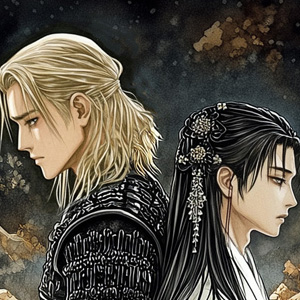In the evening, as they had agreed, he arrived at the garden gazebo. They played, but mostly just talked — and talked, and talked... The next evening, he came again.
He and the Emperor began meeting every evening for a game of Mist and Clouds.
Gerel could not shake the question: why had Yukinari agreed to these talks if he had immediately made it clear they would lead nowhere?
"I wanted to meet you face-to-face., to understand what kind of man you are..." he had said to Gerel. Most likely, this was true, but only partially so. Talking to a potential future adversary and assessing his capabilities was certainly useful. But an even better move would be to sway this very adversary to your side... Was it possible? It would be incredibly arrogant on Yukinari's part, but not foolish, not at all...
In this case, even the invitation to stay in Shinju made sense. The longer he stayed, the more time Yukinari would have to study him, observe him, and instill affection for himself. If Gerel thought about it, this was exactly what the Emperor had been doing since their first meeting: instilling affection — and doing it very skillfully, demonstrating precisely those qualities that could win Gerel over. He seemed perfect, like the hero from one of those cheap romances that made every concubine in Emperor Tokhung's harem drool. Perfect — and artificial, like a doll, Gerel told himself, trying to dismiss his growing affection for Yukinari; artificial, like everything else in this country. Carefully crafted lines designed for a specific effect. Where needed, he would demonstrate royalty and profound intelligence; where needed, disarming simplicity and honesty. Where needed, he would remind them of his difficult childhood, subtly pushing for sympathy. And that smile, always seeming so genuine, and that knowing look... A simple recipe, surely tested many times on ministers, governors, and guests from neighboring states.
His soldiers were not wrong: Yukinari was so striking that people lost their minds. Such rumors don't arise out of thin air, though, of course, it wasn't about his handsome face — it was about an unmatched charisma and years of practice in manipulating people. Gerel saw how, even with the veil over his face, Yukinari managed to do the same thing: after just a few conversations, people of any gender, age, or social standing inevitably felt drawn to fall at his feet and swear eternal loyalty and service.
However, Gerel thought about this less with envy than with respect. He knew how the mechanism worked. He had studied it when he went from a closed, gloomy soldier-boy to a commanding officer of a hundred men, and realized that being good at killing wasn't enough — you had to be able to lead people too. But Gerel didn't rely much on charm, preferring directness, a certain detachment, and at times, harshness — sometimes even cruelty. His soldiers understood that better than kindness and courtesy. After all, with his strange appearance, he would never have become "one of them," never won their affection — but this appearance fit the role of something otherworldly, a mythical monster, invincible and ruthless. The Chosen of the Tiger, the white-haired demon, the cold steel blade of Emperor Tokhung. He knew what they called him behind his back: Gerel the Cruel. And that suited him fine; he didn't need to be loved — he just needed them to believe in him.
But he understood perfectly that beauty, kindness, and apparent softness were weapons too. And in combination with insight and knowledge of human nature — they were incredibly powerful weapons. He saw how Yukinari's subjects looked at him — enchanted, like rabbits in front of a boa constrictor — and saw how Yukinari spoke to them: as if each one of them was special. He managed to find the right words for everyone — for courtiers and for servants. It was likely that the scions of noble families were trained in this — taught to look, speak, and smile correctly, just as they were taught elegance, calligraphy, choosing outfits, and the like. But not everyone could reach such heights in this art.
What was happening with Gerel now seemed to be the unfolding of one of the thirty-six classic stratagems, known as "the beautiful person": when faced with a clearly stronger opponent, weaken the enemy commander — that is, Gerel himself — by sending a beautiful woman or, in his case, a handsome man. Influence him through his emotions, dull his vigilance, destroy his ability to think rationally, make him neglect his duty and loyalty to his country. Of course, the "beautiful person" in this stratagem was usually a pretty singer or an actor. But the ruler of the land himself had descended upon him. A great honor...
The problem was, once you were, like a curious fly, caught in the web of this "beautiful person's" charm, understanding what was happening didn't help at all — and that was why the stratagem had worked so effectively for centuries.
Gerel had a hard time admitting to himself that he eagerly awaited the evening meetings with Yukinari, looking forward to their game with great anticipation. As soon as the appointed time came, he would drop everything and hurry to the garden.
Yukinari still won more often. As they played, their conversations no longer centered on the talks, the war, or politics, though they occasionally touched on those topics. One subject would smoothly lead to another, and they talked about everything under the sun. Their conversations became increasingly expansive, more personal.
Gerel felt like a fool, like a child, enchanted by a fairy tale. He found excuses to meet with Yukinari and was ashamed of it; he caught himself stealing glances, practically following the Emperor around, in awe of him. Of course, he hid it all under a veneer of cold restraint and sharp remarks — something he was very good at. Sometimes, they would argue about something, disagree, and jab at each other. But even in moments of disagreement, Gerel could see that Yukinari was genuinely interested in him, that he was important to him, no matter what they said to each other...
Gerel had not spoken like this to anyone in a long time. In fact, never before.
It wasn't that he had many people to converse with. In those rare moments when he needed something from those around him, he simply issued an order — brief and to the point. And even in his years at Ling-tsu's school in Yuigui — those memories most closely aligned with his idea of a happy, normal life — he had constantly felt like an outsider, not knowing what to say to the other students.
But with Yukinari, for some reason, he wanted to talk. Yukinari listened and heard him — and replied: sometimes not even to the words themselves, but to the thoughts that accompanied them, as though he could read them. From their very first conversation, they understood each other with half a word.
He had never experienced such deep, instant mutual understanding with anyone before.
This thought brought a skeptical smile to his lips: there had almost never been anyone in his life with whom he could talk openly; the moment someone showed even a hint of interest and affection — and he was enchanted. Foolish.
But it was hard not to be enchanted. Yukinari turned out to be not only the perfect ruler but also a conversation partner who was Gerel's equal in intellect, and with whom he was never bored. At certain moments, he even saw parts of himself in Yukinari (of course, only those qualities that didn't repel him — Yukinari was a smart, sensitive mirror)...
After every meeting with the emperor, he would try to assess what had happened objectively, replaying all the details in his mind, and he became more and more convinced that his guess was right: the Emperor wanted to make him his ally. If Yukinari had only wanted to convince him of his country's power and instill respect to achieve a better result in the negotiations, he would have used other means. No, the Emperor was consciously trying to elicit his affection. Even that seemingly random encounter in the Shinju market and Yukinari's touching relationship with the girl Momoko — perhaps that too had been arranged.
On the other hand, what did that change? Yukinari truly was brilliant to the point of genius, an excellent, hardworking ruler who genuinely cared for his country — the results were clear for all to see — and if he was aware of his own strengths and sought to use them for his own ends, was that really a sin?
Could one call someone hypocritical if, essentially, they weren't lying or pretending to be someone else, but carefully thought through every word and action, showing others exactly what they wanted to see? Carefully measured kindness, meticulously controlled sincerity... Gerel couldn't tell if he was disturbed by this particular talent or even more impressed by it.
He realized that his childish infatuation with Yukinari was pointless and would lead to no good. He tried to shield himself from the joy he felt during their meetings because this inexplicable joy clouded his thinking. Soon, Yukinari would vanish from his life or, worse, become his enemy. Though at times, he almost forgot they were enemies. The emperor, it seemed, had forgotten that too.
What did Yukinari really think of him? Undoubtedly, these games and conversations brought the emperor pleasure. Yet, Gerel couldn't help but wonder if Yukinari had been deliberately enchanting him, hoping to acquire a valuable ally for the future war, and whether every word he spoke had been carefully planned in advance.
Perhaps the conversations with Gerel entertained him, or maybe, like Tokhung, Yukinari was interested in the supernatural, which is why the white-haired yaoguai drew him in; or perhaps it was Gerel's strange appearance that intrigued Yukinari, evoking the same fascination a scientist feels for a curious insect — wanting to dissect it and see what's inside, to tear off its wings and watch what happens...











Comments (0)
See all